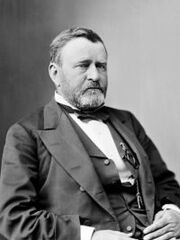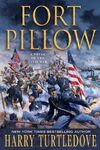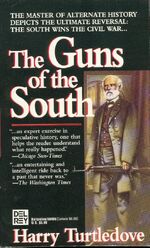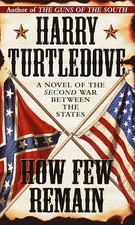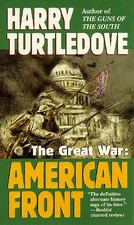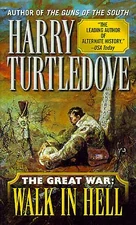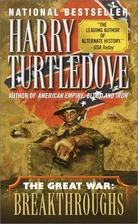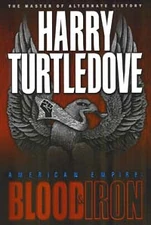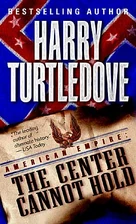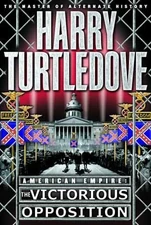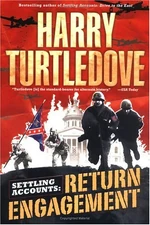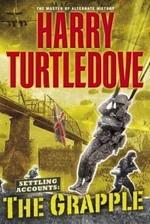ML4E (Message Wall | contribs) Tag: sourceedit |
Tag: sourceedit |
||
| Line 40: | Line 40: | ||
His most notable victory came with the [[Battle of Shiloh]], though he received much criticism after its conclusion for leaving his army unprepared defensively; he was also falsely accused of being drunk. After the battle, Grant was superseded by General Henry Halleck, while he was relegated to second in command. Grant was upset over the situation and might have left his command, but his friend and fellow officer, [[William Sherman|William T. Sherman]], persuaded him to stay in Halleck's Army. After General [[George McClellan#George McClellan in Southern Victory|George McClellan]]'s [[Virginia Peninsula#Virginia Peninsula in Southern Victory|Peninsular Campaign]] collapsed, Halleck was transferred east, leaving Grant in charge of all forces in the Western Threater. |
His most notable victory came with the [[Battle of Shiloh]], though he received much criticism after its conclusion for leaving his army unprepared defensively; he was also falsely accused of being drunk. After the battle, Grant was superseded by General Henry Halleck, while he was relegated to second in command. Grant was upset over the situation and might have left his command, but his friend and fellow officer, [[William Sherman|William T. Sherman]], persuaded him to stay in Halleck's Army. After General [[George McClellan#George McClellan in Southern Victory|George McClellan]]'s [[Virginia Peninsula#Virginia Peninsula in Southern Victory|Peninsular Campaign]] collapsed, Halleck was transferred east, leaving Grant in charge of all forces in the Western Threater. |
||
| − | His victories all came to naught; in the East, General McClellan was put back in command of the [[Army of the Potomac]], allowing it to be destroyed at [[Camp Hill]], [[ |
+ | His victories all came to naught; in the East, General McClellan was put back in command of the [[Army of the Potomac]], allowing it to be destroyed at [[Camp Hill]], [[Pennsylvania (Southern Victory)|Pennsylvania]] by the [[Army of Northern Virginia]]. This victory allowed the [[Britain (Southern Victory)|British]] and [[France (Southern Victory)|French]] to mediate a peace, thus ending the war. |
In the years afterwards, Grant became deeply depressed. He left the army and tried his hand at civilian life. When this proved to be unsuccessful, he reverted to his pre-war alcoholism. At the outset of the [[Second Mexican War]] in 1881, he was one of the few sympathetic members of a crowd in [[St. Louis#St. Louis in Southern Victory|St. Louis]] addressed by [[Frederick Douglass#Frederick Douglass in Southern Victory|Frederick Douglass]].<ref>''[[How Few Remain]]'', pg. 65.</ref> Later generations primarily remembered him as having died a drunk.<ref>''[[Blood and Iron]]'', pg. 630.</ref> Many quietly speculated Grant could have done more if he had not been shelved early, or if his forces had been transferred from the west to repair the disasters in the east. |
In the years afterwards, Grant became deeply depressed. He left the army and tried his hand at civilian life. When this proved to be unsuccessful, he reverted to his pre-war alcoholism. At the outset of the [[Second Mexican War]] in 1881, he was one of the few sympathetic members of a crowd in [[St. Louis#St. Louis in Southern Victory|St. Louis]] addressed by [[Frederick Douglass#Frederick Douglass in Southern Victory|Frederick Douglass]].<ref>''[[How Few Remain]]'', pg. 65.</ref> Later generations primarily remembered him as having died a drunk.<ref>''[[Blood and Iron]]'', pg. 630.</ref> Many quietly speculated Grant could have done more if he had not been shelved early, or if his forces had been transferred from the west to repair the disasters in the east. |
||
Revision as of 22:37, 2 September 2015
| ||||||||||||||||||||||||||||||||||||||||
Ulysses Simpson Grant (born Hiram Ulysses Grant, April 27, 1822 - July 23, 1885) was an American general and the eighteenth President of the United States (1869–1877). He achieved international fame as the leading Union general in the American Civil War, proving to be the North's most aggressive general. His tenure as general is treated more favorably by historians than his presidency, which was marred by corruption. Indeed, contemporary critics coined the word "Grantism" to describe government corruption.
After leaving office, Grant was very nearly destitute, but was able to provide for his family by publishing his memoirs. He died of throat cancer two days after completing them.
Ulysses S. Grant in Fort Pillow
In 1863, Ulysses S. Grant had made Jackson, Tennesee one of his supply depots, until Confederate General Nathan Bedford Forrest pushed Union forces back out. Forrest subsequently used Jackson as his launching-pad for the attack on Fort Pillow.[1]
Ulysses S. Grant in The Guns of the South
Ulysses S. Grant's great achievement in 1862-63 was to seize control of the Mississippi River by defeating a series of uncoordinated Confederate armies and by capturing Vicksburg in July 1863. After a victory at Chattanooga in late 1863, Abraham Lincoln made him general-in-chief of all Union armies.
He faced C.S. General Robert E. Lee during the Battle of the Wilderness through which he attempted to advance on Richmond.[2] Grant's superiority in numbers came to naught due to the AK-47s supplied by the Rivington Men to Lee.[3] A second defeat at Bealeton allowed Lee to advance on and capture Washington City.[4]
Grant later served as an Election Commissioner during the Kentucky and Missouri state-wide referendum on whether they would remain with the Union or join the Confederacy. Although he had a reputation as a heavy drinker, Grant remained abstinent during the election campaign, preferring coffee at dinner with fellow commissioner Robert E. Lee.[5] However, the night of the vote, after it became clear Kentucky voted to join the C.S., he drank himself into a stupor.[6]
In 1868, Lee had the opportunity to review Grant's Overland Campaign as it had taken place in the world the Rivington Men had come from.[7]
Ulysses S. Grant in Southern Victory
Ulysses S. Grant had retired from the US Army when the War of Secession began in 1861. He was recalled to active duty and placed in command of Volunteers. Throughout the war, Grant proved to be the most successful General in the Union Army, as he won a string of battles, from Belmont, to Fort Henry and Fort Donelson.
His most notable victory came with the Battle of Shiloh, though he received much criticism after its conclusion for leaving his army unprepared defensively; he was also falsely accused of being drunk. After the battle, Grant was superseded by General Henry Halleck, while he was relegated to second in command. Grant was upset over the situation and might have left his command, but his friend and fellow officer, William T. Sherman, persuaded him to stay in Halleck's Army. After General George McClellan's Peninsular Campaign collapsed, Halleck was transferred east, leaving Grant in charge of all forces in the Western Threater.
His victories all came to naught; in the East, General McClellan was put back in command of the Army of the Potomac, allowing it to be destroyed at Camp Hill, Pennsylvania by the Army of Northern Virginia. This victory allowed the British and French to mediate a peace, thus ending the war.
In the years afterwards, Grant became deeply depressed. He left the army and tried his hand at civilian life. When this proved to be unsuccessful, he reverted to his pre-war alcoholism. At the outset of the Second Mexican War in 1881, he was one of the few sympathetic members of a crowd in St. Louis addressed by Frederick Douglass.[8] Later generations primarily remembered him as having died a drunk.[9] Many quietly speculated Grant could have done more if he had not been shelved early, or if his forces had been transferred from the west to repair the disasters in the east.
References
- ↑ Fort Pillow, pgs. 1-2.
- ↑ The Guns of the South, pgs. 100-104.
- ↑ Ibid., pgs. 140-150.
- ↑ Ibid., pgs. 205-210.
- ↑ Ibid., pgs. 296-307.
- ↑ Ibid., pgs. 313-14.
- ↑ Ibid., pg. 431.
- ↑ How Few Remain, pg. 65.
- ↑ Blood and Iron, pg. 630.
| Political offices (OTL) | ||
|---|---|---|
| Preceded by Andrew Johnson |
President of the United States 1869-1877 |
Succeeded by Rutherford B. Hayes |
| Party political offices (OTL) | ||
| Preceded by Abraham Lincoln |
Republican Party nominee for President of the United States 1868; 1872 (won both) |
Succeeded by Rutherford B. Hayes |
| Military offices (OTL) | ||
| Preceded by Henry Halleck |
Commanding General of the United States Army 1864–1869 |
Succeeded by William Sherman |
| ||||||||||||||||
| |||||||||||||||||||
| |||||||||||||||||||||||||||||||
